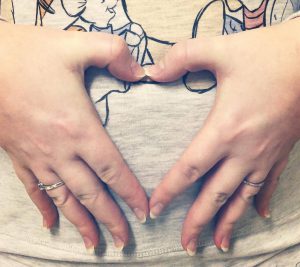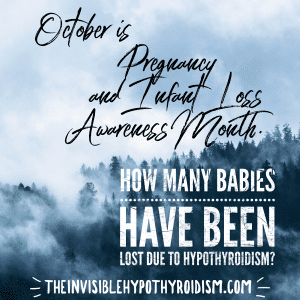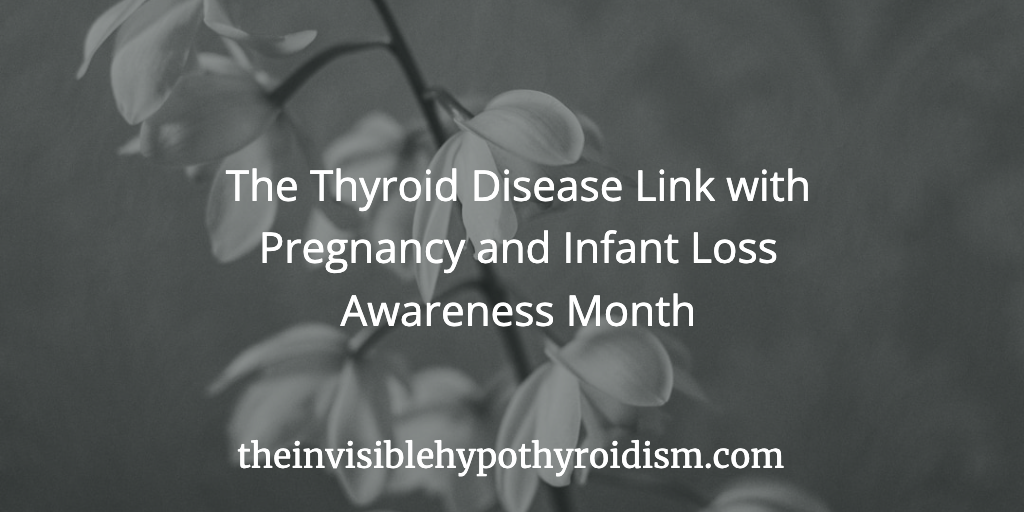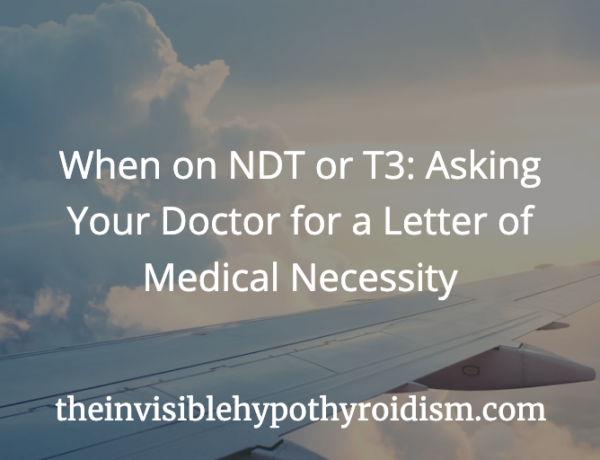Originally published on 3rd October 2018 Last updated on 1st October 2024
TW: Pregnancy loss, miscarriage
October is Pregnancy and Infant Loss Awareness Month.
Where does this tie in with thyroid disease?

Well, just having a thyroid condition puts you at a higher risk for losing an unborn child.
The Thyroid Link
Thyroid function and fertility are closely linked. Abnormal thyroid levels can lead to miscarriage, pre-eclampsia, anaemia, stillbirth and the baby developing congenital hypothyroidism itself, yet many doctors don’t think to check thyroid hormone levels in pregnant women. Women with even mild hypothyroidism have double the risk of miscarriage and premature birth.
This can be especially worrying for those feeling extremely tired, brain fogged or experiencing other common symptoms of hypothyroidism such as changes in mood, increased sleep, constipation, muscle aches and hair loss, as while a lot of these symptoms can be attributed to pregnancy itself, they can also be a sign of a thyroid problem, such as hypothyroidism and/or Hashimoto’s. Therefore, many doctors don’t think to look in to these symptoms further and rule out a thyroid condition, but instead put them down to normal pregnancy complaints instead.
Additionally, if you have the autoimmune version of hypothyroidism (Hashimoto’s), you’ll want to keep a check on adequately treating your hypothyroidism and antibodies, since some experts state that thyroid antibodies cross the human placenta and could attack your baby’s thyroid.
Research has also shown that high levels of Thyroid Peroxidase Antibodies increase the risk of premature births, so keeping Hashimoto’s well controlled can be crucial. [1]
Related Articles:
Why It’s Important to Know if You Have Hashimoto’s
The 13 Things I Did to Have a Healthy Pregnancy With Hashimoto’s and Hypothyroidism
Are Pregnant Women With Thyroid Problems Considered Higher Risk?

How Does The Thyroid Affect Fertility?
Thyroid hormones directly affect the uterine lining, causing infertility or miscarriages to occur when they are abnormal. As well as complications during pregnancy, some women with low thyroid levels may even struggle to fall pregnant at all or miscarry very early in to the pregnancy. I unfortunately experienced the pain of an early miscarriage and – shock – my thyroid hormone levels weren’t optimal. My lowish TSH implied I was over-treated and on too much thyroid medication, yet my Free T4 level was below range.
In the first trimester of pregnancy, the foetus relies completely on the mother to provide the thyroid hormones for its development. For someone with a perfectly healthy thyroid gland and function, their body is able to meet that extra demand rather easily, but in a woman with hypothyroidism and/or Hashimoto’s, her body is often not as able to. And so complications such as miscarriages can occur.
If a woman is ‘subclinical’ or ‘borderline’ hypothyroid, her doctor may wish to start her on thyroid medication or increase it so that she’s well within the reference range to reduce the risk of miscarriage. The risk of miscarriage is higher in women with subclinical hypothyroidism, compared to women with normal thyroid function (euthyroidism). [2]
Subclinical hypothyroidism in the mother is also associated with a higher risk of pre-eclampsia. [3]
According to the Endocrine Society’s 2007 Clinical Guidelines for the Management of Thyroid Dysfunction during Pregnancy and Postpartum, thyroid medication for those with hypothyroidism usually needs to be increased in dosage, by 4-6 week gestation and may well require a 30-50% increase in dosage. [4]
So, this is why it’s extremely important for any known thyroid patients to be monitored closely and tested regularly throughout pregnancy, often every 4-6 weeks, so that adjustments to their medication can be made accordingly.
However, I feel it’s important for all pregnant women to have their thyroid levels monitored (and I hope that one day this will be the norm), as pregnancy is one of the biggest triggers for Hashimoto’s and hypothyroidism, so some will develop it during pregnancy specifically or even have had it before getting pregnant, and by testing thyroid levels by default, we could catch it early on to reduce the risk of pregnancy complications such as miscarriage.
We have to be more proactive. We could save the lives of those who would otherwise be miscarried and save the heartache that so often ensues as a result.
A study presented in June 2012 at The Endocrine Society’s 94th Annual Meeting also recommended that all pregnant women should undergo thyroid screening in the first trimester of pregnancy. I quote:
“The study found that even mild thyroid dysfunction could greatly increase the risk of serious problems. Women with mild thyroid dysfunction had double the risk of miscarriage, premature labor or low birth weight as compared to pregnant women with normal thyroid function. They also had seven times greater risk of still birth.” [5]
And in the Journal of Medical Screening, researchers demonstrated that pregnant women with hypothyroidism had a second trimester miscarriage risk four times the risk of women who were not hypothyroid. [6]
How shocking is that?
What Are We Looking For?
The American Thyroid Association (ATA) recommends the use of the following TSH test ranges during pregnancy:
- First trimester: 0.1-2.5
- Second trimester: 0.2-3.0
- Third trimester: 0.3-3.0
But maintaining optimal thyroid levels for all of the thyroid panel is important, not just TSH.
The UK’s NHS recommends the following: (though the exact numbers can differ slightly depending on your surgery and lab)
TSH:
(Non-pregnancy range for TSH is usually around 0.5 – 4.4 mu/L)
- 1st Trimester: 0.09 – 2.83 mu/L
- 2nd Trimester: 0.2 – 2.8 mu/L
- 3rd Trimester: 0.31 – 2.9 mu/L
Free T4:
(Non-pregnancy range for Free T4 is usually around 10 -20 pmol/L)
- 1st Trimester: 10.5 – 18.3 pmol/L
- 2nd Trimester: 9.5 – 15. 7 pmol/L
- 3rd Trimester: 8.6 – 13.6 pmol/L
Free T3:
(Non-pregnancy range for Free T3 is usually around 3.5 -6.5 pmol/L)
- 1st Trimester: 3.5 – 6.2 pmol/L
- 2nd Trimester: 3.4 – 5.8 pmol/L
- 3rd Trimester: 3.3 – 5.6 pmol/L
I really don’t want to think about the amount of complications and miscarriages in pregnancy that will have resulted from a missed or mismanaged thyroid condition, but I do want to make others aware of its existence.
I just wish that all pregnant women were screen for a thyroid condition routinely to avoid any issues caused by one going undetected.
Miscarriage and the loss of a child is a heartbreaking experience for many and a lot of sorrow could be saved if more attention was paid to that little butterfly shaped gland in the neck that has an influence over so many bodily functions. Including fertility and maintaining a pregnancy.
This is a heartbreaking topic, but if you wish to add to the discussion, feel free to do so in the comments section below.
Related Article: 11 Things I Did to Optimise Conceiving With Hashimoto’s and Hypothyroidism

See Also:
Get The Positive Thyroid Pregnancy Book: Your Essential Guide to Navigating Fertility, Pregnancy & Postpartum Wellness With Hypothyroidism and Hashimoto’s which covers Rachel’s full two pregnancies with hypothyroidism and Hashimoto’s, on Levothyroxine and Armour Thyroid NDT and everything YOU need to know for the best start for you and your baby.
References:
[1] https://www.ncbi.nlm.nih.gov/pubmed/31808375
[2] https://www.liebertpub.com/doi/10.1089/thy.2014.0029
[3] https://www.thelancet.com/journals/landia/article/PIIS2213-8587(22)00007-9/fulltext
[4] https://www.ncbi.nlm.nih.gov/pubmed/22869843
[5] https://www.sciencedaily.com/releases/2012/06/120623144935.htm
[6] http://www.newswise.com/articles/mild-thyroid-dysfunction-in-early-pregnancy-linked-to-serious-complications.
[7] https://www.ncbi.nlm.nih.gov/pubmed/11126160




